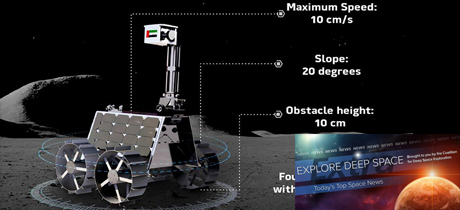In Today’s Deep Space Extra… The Chairwoman of the Space Subcommittee of the House Science, Space and Technology Committee is optimistic that Congress can pass a new NASA authorization before the current session ends in January. NASA moves ahead with new space suit development. The James Webb Space Telescope (JWST) achieves new pre-launch milestones. NASA invites K-12 students to participate in the Artemis Moon Pod Essay Contest.
Human Space Exploration
Horn hopeful for NASA authorization this year
Spacepolicyonline.com (10/6): U.S. Rep. Kendra Horn, Chair of the U.S. House Space and Aeronautics Subcommittee, spoke optimistically Tuesday before a webinar sponsored by the Wilson Center and Aerospace Corporation that a new NASA authorization bill with bipartisan support could pass this year. Senate and House versions are on deck for consideration before the end of the 116th session of Congress in January.
NASA is testing the first of its new moonwalking spacesuits
Space.com (10/6): At the October 1 meeting of NASA’s independent Aerospace Safety Advisory Panel (ASAP), panelist George Nield offered a favorable assessment of the work by NASA so far to develop a new xEMU, or Exploration Extravehicular Mobility Unit space suit. Elements of NASA’s first new space suit in four decades are undergoing evaluation in NASA’s Neutral Buoyancy Lab. Five of the garments are to be developed initially.
Space Science
NASA’s James Webb Space Telescope completes environmental testing
Coalition Member in the News – Northrop Grumman
NASA Goddard Space Flight Center (10/6): The James Webb Space Telescope (JWST) has achieved a new milestone ahead of its launch planned for October 31, 2021. A series of environmental tests of the fully assembled observatory at the Northrop Grumman facilities in California have demonstrated that Webb can survive the vibration and acoustics related to launch. Once leaving Earth atop an Ariane 5 rocket provided by the European Space Agency (ESA), the telescope will fly to the sun/Earth L-1 Lagrangian point about one million miles away to study early star and galaxy formation, and assess the atmospheres of extrasolar planets for evidence of biomarkers.
Physics Nobel honors discoveries about black holes
Sciencemag.org (10/6): Scientists from the U.S., U.K. and Germany are sharing the 2020 Nobel Prize in physics for their studies of black holes. The Prize recognizes contributions to our understanding of the universe going back to the 1990s including the discovery of a massive black hole at the center of our galaxy.
UAE to develop small lunar rover
SpaceNews.com (10/6): In an October 5 interview with Space News following their initial announcement last week, the United Arab Emirates (UAE) discussed plans to develop and send a small rover to the Moon in 2024. “Primarily, we would like to advance our capabilities and technologies,” said Hamad Al Marzooqi, project manager for the Emirates Lunar Mission at the Mohammed Bin Rashid Space Centre. “Since we’re going to the Moon, it would be a shame if we don’t do interesting science there.”
Other News
NASA contest challenges kids to imagine a trip to the Moon
Yahoo Finance (9/16): NASA is inviting students in grades K-12 to participate in the Artemis Moon Pod Essay Contest. The winners will have the opportunity to attend the launch of Artemis I, the first integrated flight of the NASA SLS mega-rocket and Orion next-generation spacecraft. The deadline for submission is December 17, 2020.

